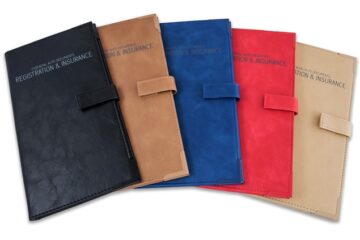There’s a lot of paperwork that comes with owning a car.
While some of it can be left at home, there are a few key pieces you should always have within reach when you’re driving.
You never know when you might get pulled over for a routine traffic stop or get into a car accident with another driver, so it’s important to know what to keep in your glove box & wallet.
Essential documents to keep in your vehicle:
- CAR REGISTRATION (!) – one of the most important documents to keep secure in your glove compartment. It shows that you can legally drive the car on the road and you or a family member own it. If you are stopped by a law enforcement officer, you will be asked to present a copy of your car registration along with other documents. It is crucial that you keep your vehicle registration up to date and that you renew it as required by law.
- VEHICLE INSURANCE (!) – aka your insurance card and the paperwork that comes with it. During routine traffic stops, drivers will also be required to show proof of car insurance. Most auto insurance companies provide drivers with insurance cards that state the details of their policy. A car insurance card also includes the minimum amount of liability insurance required by state law. Always keep your proof of vehicle insurance in your glove box along with your car registration documents.
- Technical inspection card (certificate of inspection) – in some countries it’s mandatory to have this document in your vehicle at all times. If you’re in one of those countries just make sure it’s always up-to-date.
- Emissions paper (smog check) – depends on what type of vehicle you drive and the state or country laws your vehicle is registered in.
Documents to have with you (in your wallet) while driving:
- DRIVER’S LICENCE (!) – your driver’s license is one of the most important documents in your wallet and your car. It’s required by law to have your license with you while operating an automobile. If you are caught driving without your license, your car could be impounded, your license could be suspended and also you could be charged up to a few thousand dollars.
- AUTO CLUB & FUEL/GAS CARDS – for discounts or deals. Fuel cards are used as payment most commonly for gasoline and other fuels at gas stations.
Other useful things to keep in your vehicle:
- OWNER’S MANUAL – the owner’s manual of your car contains important information that every driver must be aware of. Becoming familiar with the owner’s manual can help you understand how to set up your car, how to check car fluids and how to gauge tire pressure. The owner’s manual can usually be found within the glove compartment (or in the trunk) of a car, so it is best to leave it there for future reference.
- PEN AND PAPER (OR A NOTEPAD) – these can come in handy in all kinds of situations, from writing down the name, phone number and insurance details of another driver following a car accident, leaving your phone number in the windshield if parking in a crowded neighborhood or just taking some notes you want to remember.
- AUTO LOG BOOK – mostly ideal for car enthusiasts & business owners. Keeping a log book of your vehicle not only helps you keep your car running and functioning for a long time, but it also adds a level of authenticity to the value of your vehicle. It can help you record and keep track of everything about your car with simple tables. If you are looking for a great Auto Log Book, we have one on hand and you can download it for free here.
- MEDICAL INFORMATION – to be prepared for an emergency, it is always a good idea to keep a document with your medical information. It is recommended to write down a detailed list of your medical conditions, medications, and allergies for each family member just in case you are involved in an accident and can’t communicate these conditions at the time of the incident.
- MAPS / ATLAS – these can serve as a backup if your GPS technology fails while on a trip, or your phone runs out of juice.
- ROADSIDE ASSISTANCE CARD – if your car breaks down by the side of the road, it’s good to have on hand a number you can call right away for help. Many credit cards offer free roadside assistance benefits, so you might check yours.
Documents to keep at home:
- SALE DOCUMENTS (TITLE) – you don’t need your bill of sale or transfer of ownership to drive. You should keep all of these documents out of your car and in a safe place. These items are proof that you own the car and that it’s safe to be on the road. If you ever want to sell your vehicle you’ll need to provide the new owner with these documents.
- MAINTENANCE RECORDS – it’s also not necessary to keep your maintenance records in your vehicle, it’s best to file those receipts as soon as you get home from the mechanic. Maintenance records can help you predict when it’s time for a tune-up or an oil change.
Never drive without the necessary documents required by law and keep vital ownership information far away from your car.
Don’t forget to make duplicates, store them separately and keep digital versions of your most important documents!
If you never want to worry about your essential documents you should organize them in a Glove Box Organizer Case, that will also help you to keep your car & glove compartment neat & clean all the time! Designed with enough room to hold everything in one place and keep your important documents protected and safe from tearing, bending or being ruined by moisture.
It comes with an easy to use and compact Auto Log Book, which includes 4 categories (Fuel Log, Trip Log, Maintenance & Repairs, and Notes) to help you record and keep track of everything about your car with simple tables. Available in gray, red, blue & black.





You can also organize your most important documents in a sleek Registration & Insurance Holder separated from the car manuals if that fits more your style. Available in black, blue, beige, red & brown.






Or even something sleeker just for the essentials (!) if you’re looking for something really small & handy.



What do you carry in your glove compartment? Got any other tips? Let us know in the comments below!
PS: Keep this page bookmarked as we will be updating it if there are new requirements by law. Also, based on our reader’s feedback and we’ll bring new product recommendations too!



1 Comment
How much time do you spend in your car? - PlusXpres · December 29, 2020 at 11:30 am
[…] you can check our article too, where we discussed what documents should you keep in your car and many also useful tips […]